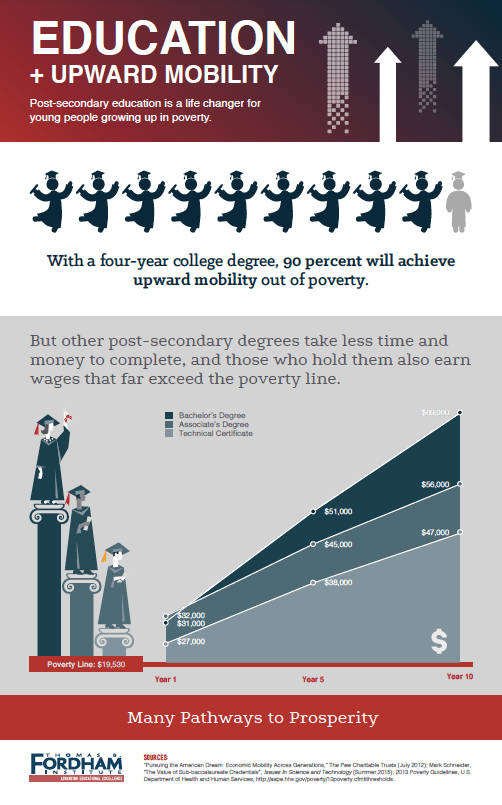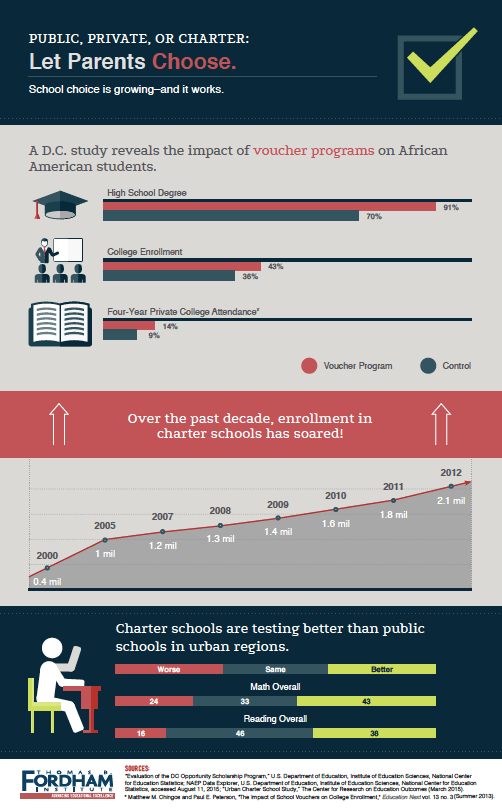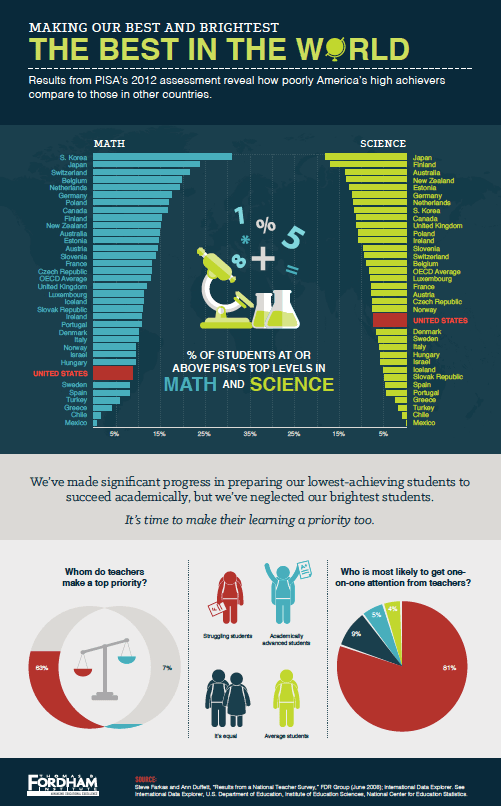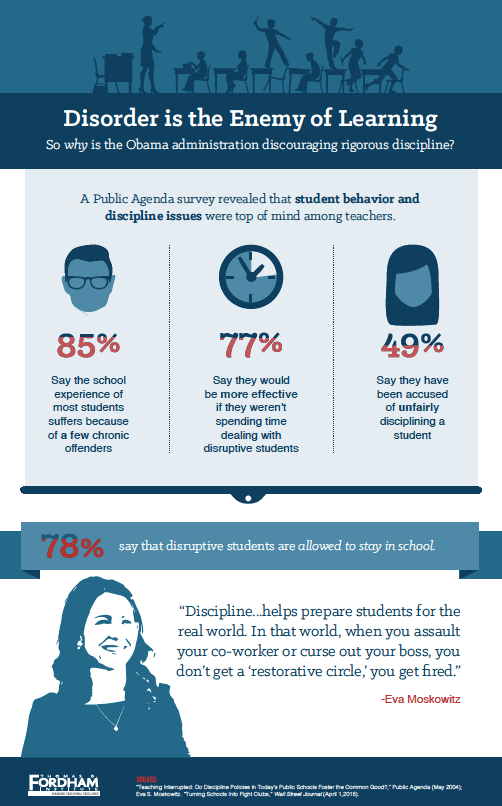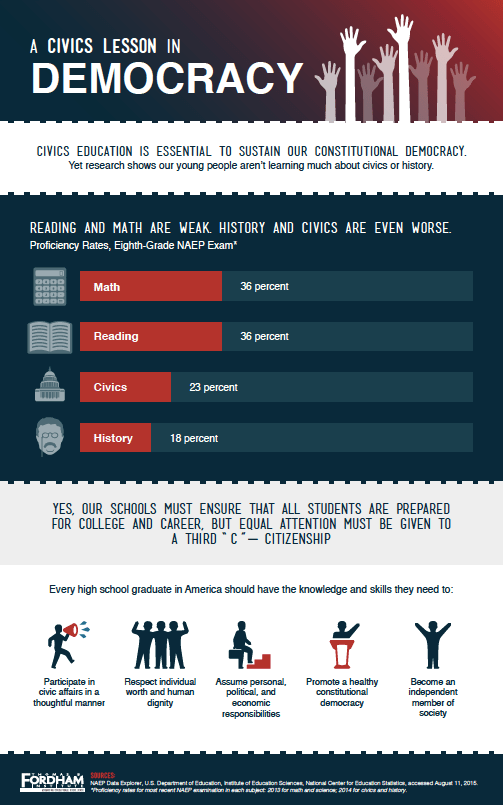Education policy is rarely a top issue in presidential campaigns. In the main, that's fine; most of the action takes place at the state and local levels. Still, last week's education policy summit hosted in New Hampshire by the education news website the Seventy Four and the American Federation for Children gave six of the seventy GOP presidential contenders the chance to burnish their K–12 credentials. (A second summit featuring Democratic candidates is slated for October in Iowa.)
To help the candidates hone their stump speeches, those of us at the Fordham Institute spent some time recently brainstorming campaign themes we'd like to see candidates from either party embrace. Here's what we came up with:
Education reform is working. It's by no means unanimous or uncontroversial, but Americans are generally supportive of the education reform agenda, broadly defined. An Education Next poll released last week shows solid (if softening) support for reform staples like charter schools, testing and accountability, merit pay for teachers, and tax credits to fund scholarships for low-income children. Voters even like higher standards—as long as you don't use the words "Common Core." And while there's no room for complacency, reform is working: Test scores are trending up, particularly in math. Graduation rates are too, especially for low-income kids of color.
Most likely to adopt this in her stump speech: Hillary Clinton. She has vocally supported charter schools since her husband's presidency. Democrats at the national level—including her former boss, President Obama—have largely supported the reform agenda for decades. By the time the general election rolls around, Clinton will want to remind centrist voters of her reform bona fides.
College isn't the only ticket to upward mobility. One of the great overreaches of the reform era is the "college-for-all" mantra that so many have preached for years. In the documentary Waiting for Superman, journalist Jonathan Alter memorably observed, "If you don't go to college, you're kinda screwed in America. And America's kinda screwed." This take is, well, screwy. Yes, there's a substantial wage premium associated with earning a college degree. But if the goal is upward mobility—and it should be—college is not the only route to the middle class. Many forms of postsecondary training and education are closely associated with higher wages, not just four-year college degrees.
Most likely to adopt this in his stump speech: John Kasich. The Ohio governor can brag about beefing up career and technical education during his tenure, including initiating such options in middle schools and allowing students to gain industry credentials while still in high school.
School choice is growing—and changing lives. Charter schools now educate nearly three million American children, with hundreds of thousands more on waiting lists. The Education Next poll shows support for charter schools slipping from a high of 54 percent last year to 51 percent now, but that's still nearly double the number of those who oppose them (27 percent). The reform rhetoric of rescuing low-income kids stuck in failing schools has clearly made an impact. Wonks debate whether choice "works" to spur improved outcomes, but parents seem to value choice as an end in itself.
Most likely to adopt this in his stump speech: Jeb Bush. He already claims to have created the country's most ambitious school choice programs as Florida's governor. "This is America," he said of school choice at Wednesday's education summit. "Why wouldn't we think we could apply the same commonsense principles in everyday life and apply it to education?"
America's best and brightest need attention, too. When I taught fifth grade at low-performing public school in the South Bronx, I lamented one day to an assistant principal that the kids in my class who were at or above grade level were getting none of my attention. "Those kids aren't your problem," she replied tartly. The lesson stuck, and it stung: Most of our efforts in education today are aimed at getting stragglers to the starting line. Those already there are too often starved for attention. In a recent Wall Street Journal op-ed, my colleagues Chester Finn and Brandon Wright put it well: "If we cannot bring ourselves to push smart kids as far as they can go, we will watch and eventually weep as other countries surpass us in producing tomorrow's inventors, entrepreneurs, artists, and scientists."
Most likely to adopt this in his stump speech: Ben Carson. If a poor kid who grew up to become a brain surgeon can't get America excited about gifted education, who can?
School discipline is under attack. Ask a teacher, "What's the biggest factor holding back student achievement in your school?" Don't be surprised if many, and perhaps even most, cite disruptive student behavior. Unfortunately, black students are three times more likely than white students to be suspended from school. That's led the Department of Education's Office of Civil Rights to demand racial parity in rates of punishment. The numbers don't lie, but this is a devilishly hard issue to manage successfully from thirty-five thousand feet. Schools need to be deeply reflective about discipline. But it's hard to imagine much good coming from schools becoming afraid to maintain basic order for fear of running afoul of the feds. Moreover, the Education Next poll asked the public about "disparate impact" in discipline too. Teachers hate it.
Most likely to adopt this in his stump speech: Scott Walker. The Wisconsin governor has tried to explain away his flip-flopping on Common Core as protecting local control of schools. Arguing that Common Core is federal overreach is a thin reed. This is a flaming arrow.
Bring back civic education. It's a pretty safe bet that Horace Mann, the father of public education, went to his grave never once having uttered the phrase "college- and career-ready." We've become used to thinking of education as almost entirely a private good. But there's an essential public dimension to education that has largely gone missing in the education reform era: preparation for informed participation in our democracy. Along with college and career, it's time to restore a third C as a coequal goal of education: citizenship.
Most likely to adopt this in her stump speech: Carly Fiorina. “We are no longer educating citizens," she said at Wednesday's education summit. "I think it's a good idea if everyone has to take a citizenship test.”
Editor's note: This post originally appeared in a slightly different form at U.S. News & World Report.


